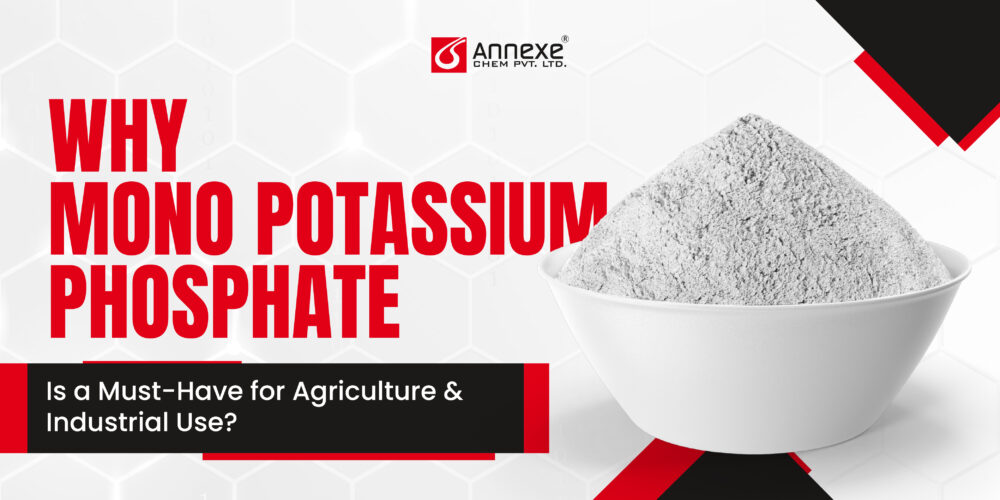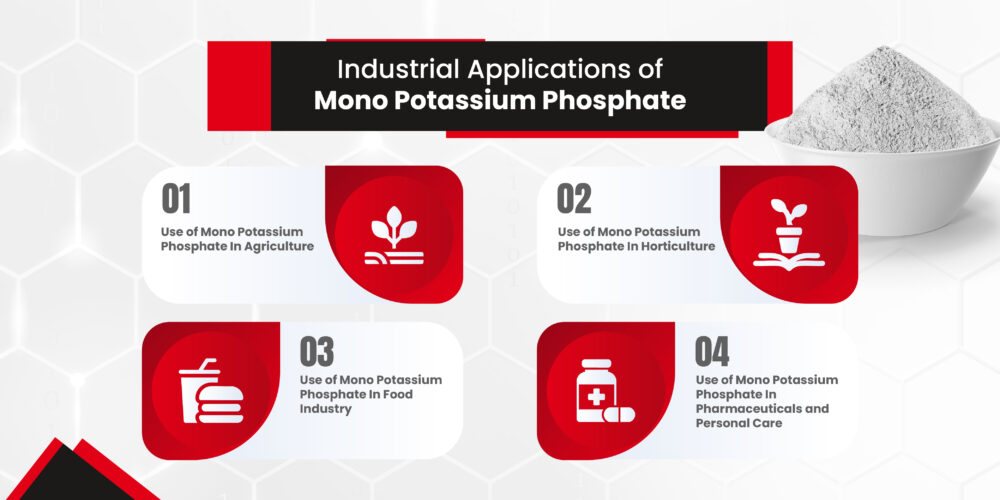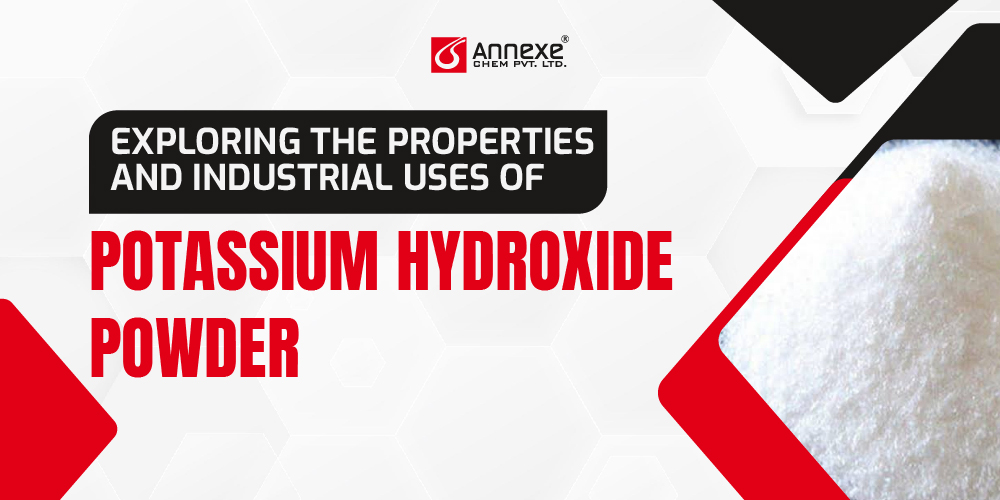Why Mono Potassium Phosphate Is a Must-Have for Agriculture and Industrial Use? - Annexe Chem Pvt Ltd
Why Mono Potassium Phosphate Is a Must-Have for Agriculture and Industrial Use?

- October 23, 2024
- By Akshita Patel
In the world of agriculture, gardening, and even the food industry, there’s a powerful yet often overlooked ingredient that helps drive growth and efficiency—Mono Potassium Phosphate (MKP). Whether you’re a farmer looking to boost your crop yield, a home gardener striving for vibrant blooms, or a food manufacturer seeking a reliable preservative, MKP plays a crucial role in enhancing quality and performance. But what exactly is MKP, and why is it so versatile? In this blog, we’ll dive into the science behind this compound, its wide-ranging uses, and how it can transform the way we grow plants, preserve food, and more.
Let’s unlock the potential of MKP together!
What is Mono Potassium Phosphate?
Mono Potassium Phosphate (MKP) is a chemical compound with the formula KH₂PO₄. It is composed of one potassium ion (K⁺), one phosphate ion (PO₄³⁻), and two hydrogen ions (H⁺). This combination makes it an excellent source of both potassium (K) and phosphorus (P), two essential nutrients for plant growth. Its molecular structure allows it to be highly reactive in various applications, particularly in agriculture and food processing.
MKP appears as a white, crystalline powder that dissolves easily in water. Its solubility is one of its key advantages—MKP can dissolve in cold or warm water, making it suitable for use in irrigation systems, foliar sprays, or soil applications. The compound is also pH-neutral, meaning it doesn’t alter soil acidity, ensuring safe application across a wide range of soil types. Thanks to its low salt index, MKP minimizes the risk of plant burns, even when used in sensitive crops.
Industrial Applications of Mono Potassium Phosphate
Mono Potassium Phosphate (MKP) is highly valued across various industries, thanks to its versatile properties. From enhancing plant growth in agriculture to improving food safety in the food industry, MKP plays a pivotal role in driving efficiency and quality in many sectors.

Use of Mono Potassium Phosphate In Agriculture:
MKP as a Fertilizer and Its Benefits for Plant Growth Mono Potassium Phosphate is widely used as a fertilizer in agriculture, where it serves as a highly efficient source of both potassium and phosphorus—two key nutrients that plants need for optimal growth. Potassium helps regulate various physiological processes in plants, including water uptake, enzyme activation, and the strengthening of plant tissues, making crops more resistant to diseases and drought. Meanwhile, phosphorus is essential for photosynthesis, energy transfer, and the development of strong roots and flowers.
MKP’s high solubility makes it particularly beneficial in drip irrigation and foliar spray systems, allowing for quick nutrient absorption by the plants. Since it is virtually free of chloride, sodium, and heavy metals, it is especially suitable for crops that are sensitive to salts, such as potatoes, strawberries, and various leafy vegetables.
Role in Soil Nutrient Management MKP’s neutral pH (around 4.5) ensures that it doesn’t disturb the natural acidity or alkalinity of the soil. It can be applied directly to the soil or mixed with other fertilizers, offering flexibility in nutrient management. Because it doesn’t contain nitrogen, it is often used during the later stages of plant growth when nitrogen levels need to be reduced to avoid excessive foliage and promote fruiting. This precise nutrient management helps boost crop yield and quality while reducing the environmental risks associated with over-fertilization.
Use of Mono Potassium Phosphate In Horticulture:
MKP for Flowers, Fruits, and Vegetables In horticulture, MKP is prized for its ability to stimulate flowering and fruiting, making it a go-to fertilizer for fruits, vegetables, and ornamental plants. When applied as a foliar spray or through fertigation, it provides an immediate source of potassium and phosphorus to support flowering and fruit development. This is particularly useful for flowering plants like roses, orchids, and fruit-bearing crops such as tomatoes, apples, and grapes.
Importance in Improving Crop Yield and Quality The balanced supply of potassium and phosphorus provided by MKP enhances the overall quality of fruits and vegetables. It promotes higher sugar content in fruits and improves their color and size, making them more appealing to consumers. In vegetables, it helps improve taste and texture while extending shelf life. By supporting a balanced nutrient environment, MKP contributes to healthier, more robust crops that can withstand environmental stressors like pests, diseases, and climate variations.
Use of Mono Potassium Phosphate In Food Industry:
Use as a Food Additive (E340) In the food industry, MKP is registered as a food additive under the code E340. It is used as an emulsifier and stabilizer, helping to maintain the texture and consistency of food products. Its properties also allow it to act as an anti-caking agent, preventing powdered and granular products from clumping together.
Role in Food Preservation and as an Acidity Regulator MKP is commonly used as an acidity regulator in various processed foods. Its ability to stabilize pH levels helps prolong the shelf life of products by preventing spoilage due to fluctuations in acidity. In addition, its buffering capacity ensures that the taste and texture of the product remain consistent, making it a preferred additive in dairy products, bakery items, and beverages.
In processed meats and cheeses, MKP can also enhance moisture retention, which improves texture while reducing the likelihood of foodborne pathogens developing. It is widely considered safe and effective, contributing to better food quality without the use of harmful chemicals.
Use of Mono Potassium Phosphate In Pharmaceuticals and Personal Care:
Presence in Pharmaceutical Formulations In the pharmaceutical industry, MKP is used in the formulation of various medicinal products due to its solubility and stability. It is employed as an excipient—an inactive substance that acts as a carrier for the active ingredients of a medication. MKP ensures that the medication dissolves properly and is easily absorbed by the body. Additionally, it helps maintain the pH balance in liquid medications and enhances the effectiveness of drugs that require a stable environment to function.
Use in Personal Care Products Mono Potassium Phosphate is also found in personal care products such as toothpaste, shampoos, and skin-care items. In these products, it functions as a buffering agent that helps maintain the product’s pH and stability, ensuring that the active ingredients perform effectively. It can also be used to control the viscosity and prevent the crystallization of certain ingredients, making it valuable in the formulation of cosmetics and skin-care products.
Mono Potassium Phosphate is a versatile compound that offers significant benefits across multiple industries. Its role as a fertilizer in agriculture and horticulture enhances plant growth and quality, while in the food and pharmaceutical industries, it contributes to safety, stability, and product integrity. Whether you’re growing crops or formulating health and beauty products, MKP’s properties make it an essential ingredient for improving efficiency and outcomes.
Comparing Mono Potassium Phosphate with Other Fertilizers
When choosing a fertilizer for crops, it’s essential to weigh the options and understand how each product benefits plant growth and soil health. Mono Potassium Phosphate (MKP) is a powerful source of potassium and phosphorus, but how does it compare with other commonly used fertilizers like Di-Ammonium Phosphate (DAP) and Urea? Let’s break down the differences in terms of nutrient content, cost-effectiveness, and overall efficiency.
MKP vs. Di-Ammonium Phosphate (DAP)
- Nutrient Composition: MKP provides potassium (K) and phosphorus (P), ideal for later growth stages, while DAP offers nitrogen (N) and phosphorus, making it suitable for early-stage growth.
- Application: MKP is used in foliar sprays and fertigation for precise nutrient delivery, while DAP is applied to the soil at planting to boost root and shoot development.
- Cost-Effectiveness: MKP is more targeted and ideal for high-value crops, but DAP is cheaper for bulk applications where nitrogen is needed.
MKP vs. Urea
- Nutrient Composition: MKP provides potassium and phosphorus without nitrogen, while urea is a concentrated nitrogen source.
- Application: MKP is used for flowering and fruiting, whereas urea is applied early to promote leaf growth. Urea is best for nitrogen-heavy crops but lacks potassium and phosphorus.
- Cost-Effectiveness: Urea is more affordable for nitrogen delivery, but MKP offers a more balanced nutrient supply, especially for crops sensitive to nitrogen.
Summary
- MKP is ideal for targeted, later-stage applications with potassium and phosphorus needs.
- DAP is more cost-effective for early-stage crops requiring nitrogen and phosphorus.
- Urea is highly efficient for nitrogen but lacks potassium and phosphorus.
Mono Potassium Phosphate (MKP) is an essential fertilizer and fine chemical that plays a pivotal role in agriculture, horticulture, the food industry, and more. Its unique combination of potassium and phosphorus offers precise nutrient delivery, making it ideal for crops at different growth stages.
For premium-quality MKP, Annexe Chem Private Limited is a trusted name in India. As a leading manufacturer and distributor, we offer an extensive range of fine chemicals, including Potassium Acetate in multiple grades such as LR, AR, ACS, IP, BP, USP, EP, JP, and food grade. With our FDA-GMP-certified facilities, we ensure that our products meet the highest quality standards. As the best Mono Potassium Phosphate distributor in Vadodara, we prioritize product integrity with advanced packaging technology and offer competitive pricing along with timely delivery. When you choose Annexe Chem Pvt Ltd, you’re choosing excellence, reliability, and quality.

Akshita Patel
As an advocate for sustainability, Akshita is committed to driving positive change within the chemical industry. She actively seeks out environmentally friendly solutions and promotes the adoption of sustainable practices. Akshita believes that a balance between economic growth and ecological responsibility is crucial for the industry's long-term success. She is dedicated to finding innovative ways to minimize environmental impact while maximizing efficiency and profitability.
Related Blogs

- March 23, 2023
- By Akshita Patel
Why Annexe Chem is The Best.
Founded in 2008, Annexe Chem Private Limited deals with manufacturing a wide range of Pharma APIs,.

- November 11, 2024
- By Akshita Patel
Exploring the Properties and Industrial Uses.
Imagine a single white powder that plays a crucial role in producing everything from the soap.



